Insightful newsletter of Drishtikone: Issue #132 - The FinCEN files and Clash of Civilizations
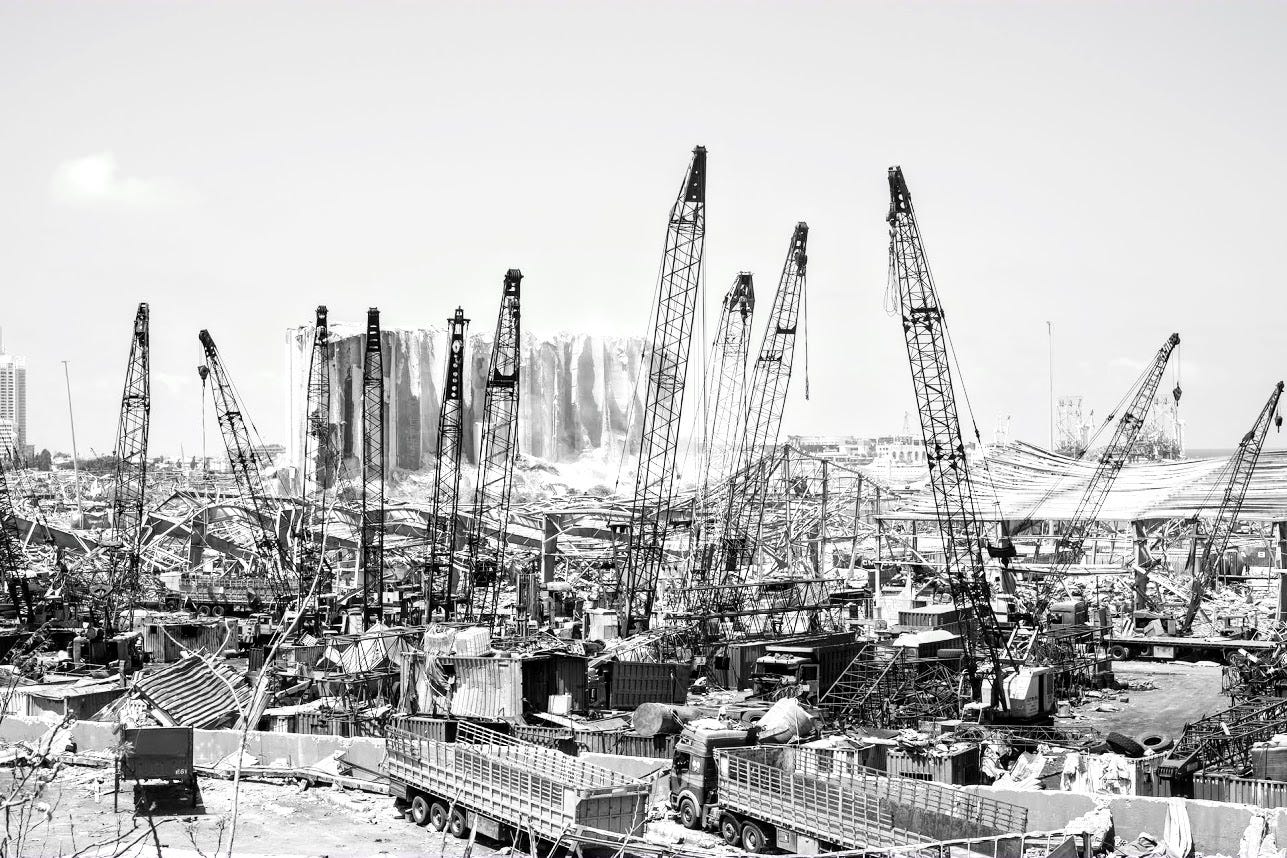
(Photo by rashid khreiss on Unsplash - Port of Beirut Explosion. Photo was taken days after the explosion.)
“Recognise that the apparent is unreal, while the unmanifest is abiding. Through this initiation into truth you will escape falling into unreality again.” ― Ashṭāvakra, Ashtavakra Gita
Slowly and gradually the dust clears one can see the patterns emerging. Why are Pakistani banks being used by terrorists who are funding and financing other terrorists like Dawood Ibrahim?
Meanwhile, why are Lashkar-e-Taibba and ISI creating alibis for religiously indoctrinated men, with terror inclinations so they can get asylum in Italy?
As the extremism increases in Europe, and such infiltration happens unbridled, where is this going?
Does it need a genius to figure that formal battle for the clash of civilizations has now been operationalized?
What one finds incredible is why would all the intelligence agencies of those countries let it happen anyway? Because this clash will not happen on any battlefield, but in the cities, homes, and sub-divisions.
The FinCEN Files
An unusual trove of information has come out. This information provides insight into the global money-laundering racket.
What are these files?
More than a year ago, BuzzFeed News received a remarkable collection of secret government documents. This huge trove had been assembled at the request of law enforcement agencies and congressional committees investigating the 2016 presidential election and other matters. The documents contained private banking information about public figures and senior government officials around the world — along with suspected criminals and organizations tied to terrorism. (Source)
These documents show 2,100 suspicious activity reports or SARs. What exactly is a SAR?
….which banks and other financial institutions submit to the US Treasury Department’s Financial Crimes Enforcement Network, or FinCEN, when they observe transactions that suggest money laundering or other illegal activity. Such reports can support investigations and intelligence gathering — but by themselves they are not evidence of a crime.
These SARs are from 2011 to 2017, and some transactions go back to 1999.
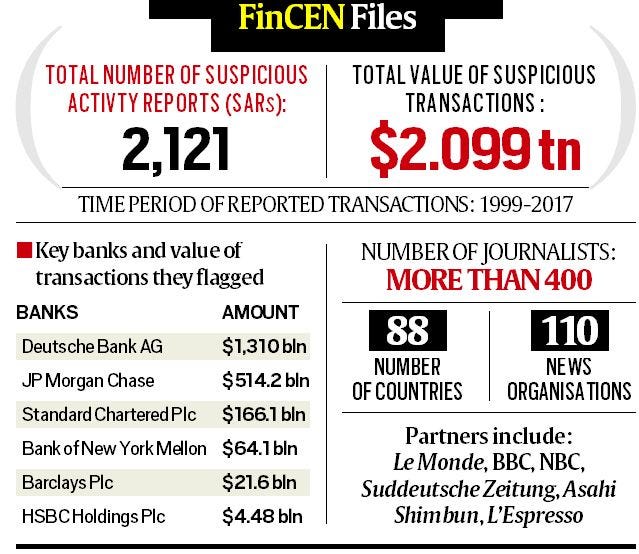
(Source: Indian Express)
Here are some interesting insights coming out:
Nepalese companies and banks have been involved in helping Iranian and Chinese firms to circumvent US sanctions. In all $293 mn have been transacted through the Nepalese intermediaries.
9 banks, 10 companies and various individuals in Nepal were found to have transacted (sent/received) suspicious funds in the name of cross-border trade.
"This shows that some Nepali business entities are linked to the international smuggling of gold, antiquities, bitumen, and telecommunication equipment. Standard Chartered Bank, Prime Commercial Bank, Bank of Kathmandu, Nepal Investment Bank, Everest Bank, Mega Bank, Himalayan Bank, Apex Development Bank of Kaski, and Nepal Bangladesh Bank are mentioned in the list of banks that are involved in transferring money suspicious," the 25 paged report based on covering Nepal stated. (Source)
Another link is to Pakistani terror money.
Pakistani national Altaf Khanani, also the chief financier of Dawood Ibrahim, was involved in laundering $14-$16 billion annually and funding drug cartels and Islamist terror outfits across the world such as the Taliban, Hezbollah, and al-Qaeda. (Source)
Altaf has also financed Lashkar-e-Toiba and Jaish-e-Mohammed (Source)
It is important to remember that Dawood Ibrahim was designated as a terrorist.
The U.S. Treasury Department today announced that it is designating Dawood Ibrahim as a Specially Designated Global Terrorist under Executive Order 13224 and will be requesting that the United Nations list him as well. Today�s designation freezes any assets belonging to Ibrahim within the U.S. and prohibits transactions with U.S. nationals. The UN listing will require that all UN Member States take similar actions. (Source)
Now, six Pakistani banks have been named - Allied Bank, United Bank (UBL), Habib Metropolitan Bank, Bank Alfalah, Standard Chartered Bank Pakistan, and Habib Bank (HBL). Their SARs happened in 2011 and 2012.
A new combination of business model going forward
Since companies like Amazon and Flipkart (in India) have come up and online sales expanded, the debate has been whether “brick-and-mortar” (physical) stores will even survive.
And, this became a major question during the pandemic when suddenly sales on online stores started expanding.
However, this thread is very interesting as it shares the empirical data with some startling insights. (Source)
Yes, the online sales channel is critical. But it works best when it compliments physical store, not replace it. People like the facility of ordering online and picking on the curb-side.
Online sales rose sharply during the pandemic. But the channel did not dominate. Most sales during the peak of lockdown were still made at those physical stores that remained open (September onward are forecasts).
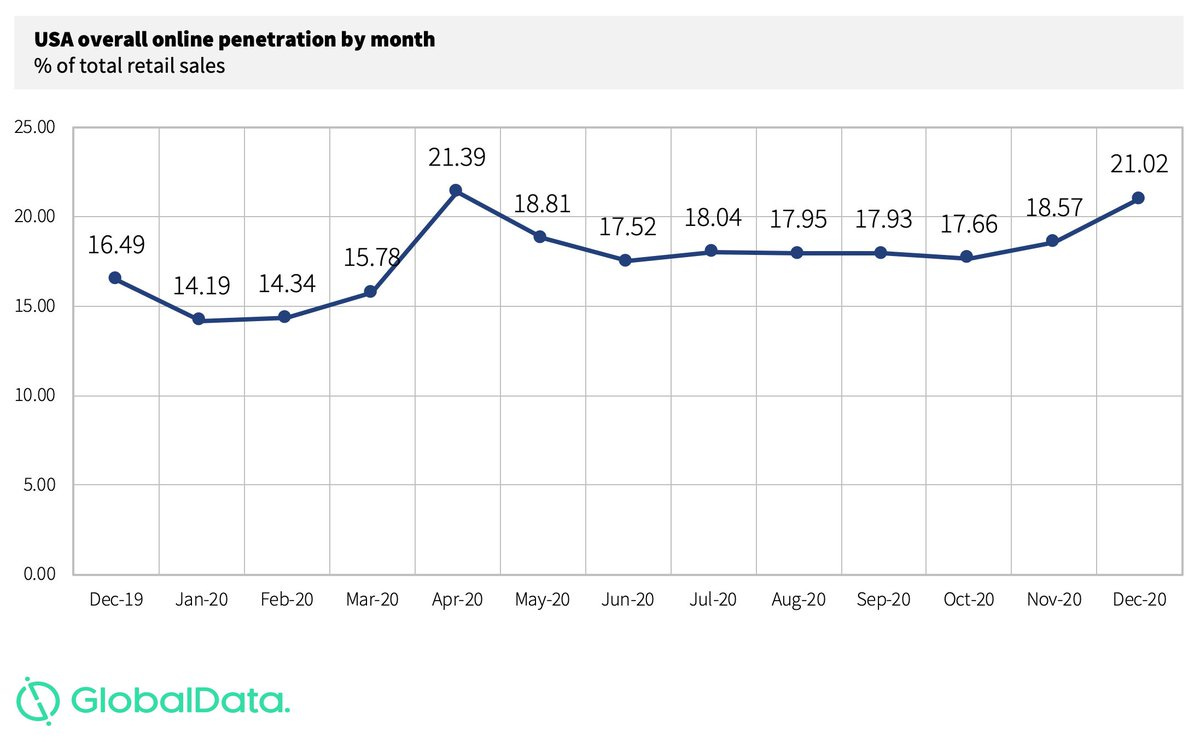
the penetration rate for online is coming down as consumers resume physical shopping. Sure, penetration will remain elevated compared to 2019 but the peaks seen during lockdown were exceptional, not a new normal.

the highest growth rates over the past few months have come from multichannel retailers, not from pure-play online retailers. In the US, many traditional retailers have been very innovative in using their stores to offer services like a curbside pickup.
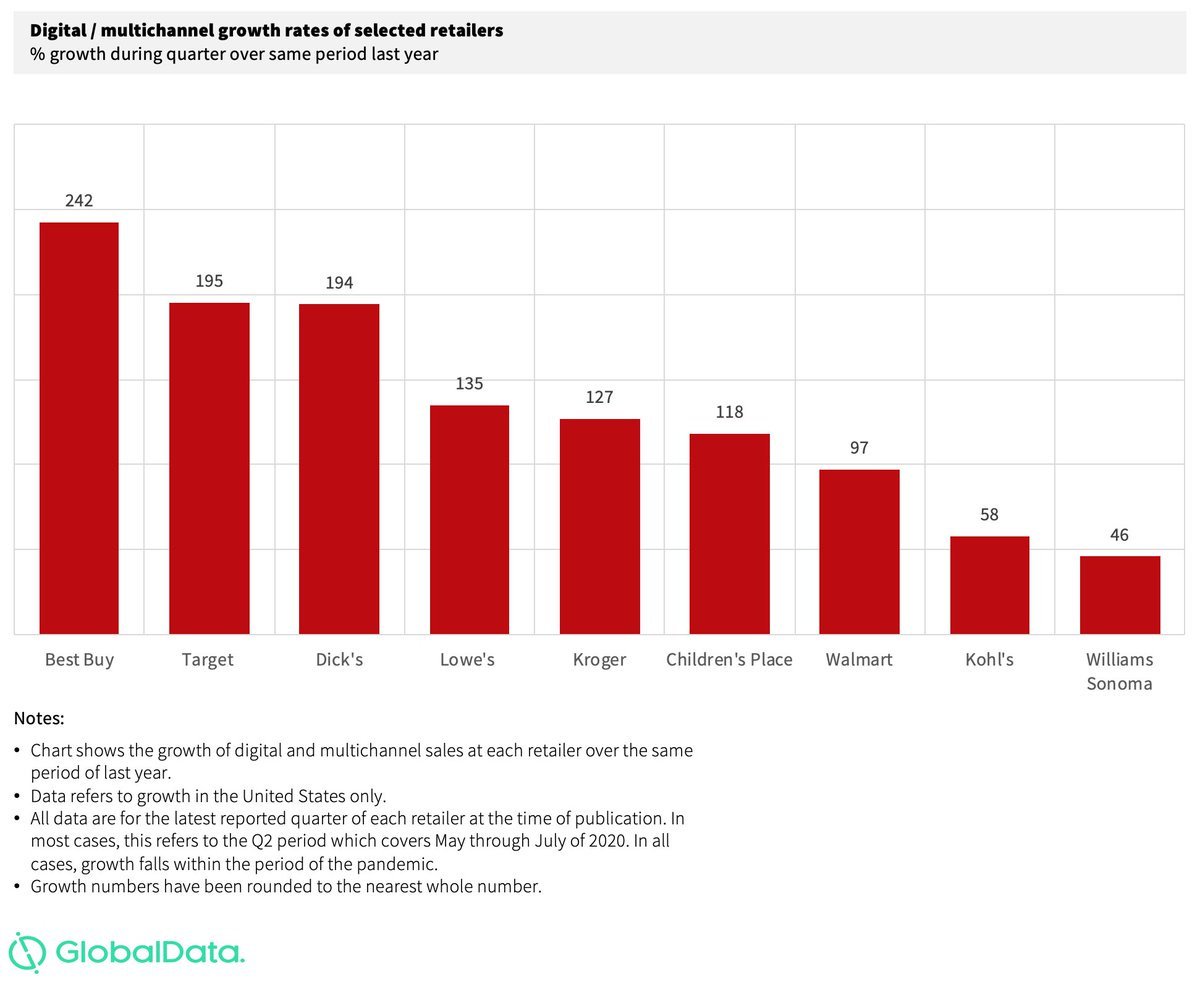
How Jihadis are infiltrating Italy - the Pakistan-Perugia Connection
This statement by the Tribunal of Perugia (sentence number Nr. 3213\2019 R.G. 30 June 2020) about a refugee case is interesting:
“In the appeal it is deduced that Ali (surname not given for obvious reasons), was born and raised in Karachi, Pakistan, where he earned the title of mechanical engineer and worked as a freelance professional; that he is of Sunni Muslim religion, and in 2015, attended a course in which Islamic rules were imparted; in 2017 he went to Kashmir to attend a course of the aforementioned group; he was taken to a centre of training – the course consisted of physical training and use of weapons for the purpose of jihad. He finished the course and returned home. Subsequently, the Islamist group ‘Lashkar-e-Taiba’ asked him to join them. The applicant made excuses to reject the invitation; this drew their wrath. When he learned that they were planning his kidnapping, he decided to leave Pakistan for Italy”. (Source)
The information shared by Francesco Marino is very interesting. (Please read this article to know who she is - Who is Francesca Marino – the Italian Journalist who gave eyewitness accounts of Indian Air Strike on Balakot?)
The guy’s story was a made-up one which he couldn’t sell it initially. But then all the “stars aligned” and he, a trained Jihadi who was suddenly being hunted (a story with many holes) by LeT and ISI, got the asylum in Italy.
The camps they live in have interesting dynamics.
“Truth is,” says one of the official cultural mediators at a refugee camp, a Pakistani himself, “They are all Punjabis, and I've never seen, except a few Ahmadiyyas, somebody belonging to a persecuted minority.” According to people living in the same refugee camp, they often attack individuals belonging to minorities and those they deem as ‘kafirs’.
This needs to be remembered when we discuss the CAA issue. The people who have gotten asylum in places like Italy have been Sunni Punjabi Muslims from Pakistan. Those numbers, Marino suggests, are overwhelmingly in majority when it comes to the Pakistani crowd.
So, is that really a situation of someone “persecuted” seeking asylum? Or economic migration? Or worse still, as may be the case in Ali’s scenario - a terror infiltration?
For, if it is an economic migration as opposed to an asylum for the persecuted, then the laws will be very different.
Just like the laws for say, a Jew from Iran (persecuted asylum) under the Lautenberg Amendment is different from an economic migrant from Mexico. The migrant from Mexico can be sent back but the Jew from Iran cannot be sent back by international law for that comes under the principle of non-refoulment. Principle of non-refoulment bars deportation of Refugees back to a place where they will face persecution. International laws prohibit Refoulment!
Unfortunately, the Indian government and its representatives did NOT argue their case on the Citizenship Amendment Act properly. They should have posited the persecuted Hindu from Bangladesh against the economic Sunni migrant from the same country or a Christian/Sikh/Hindu from Pakistan to a Sunni Punjabi from the same country and clarified the need to enforce the principle of non-refoulment for the former persecuted people while clarifying that a Sunni Bangladeshi is an economic migrant. The Sunni Punjabi from Pakistan crossing over to India is even worse. A terrorist.
For further reading - please do read CAA Law – Refugee Vs Migrant distinction is the key and Why CAA: Refugees Vs Economic Migrants and National Security
when you can’t fight, copy Hollywood scenes as your war exploits
The People's Liberation Army Air Force must be really short of real battle scenes and exploits. For, in its infinite wisdom, it posted propaganda videos on the weekend to tout its bombers. The H-6K bombers.
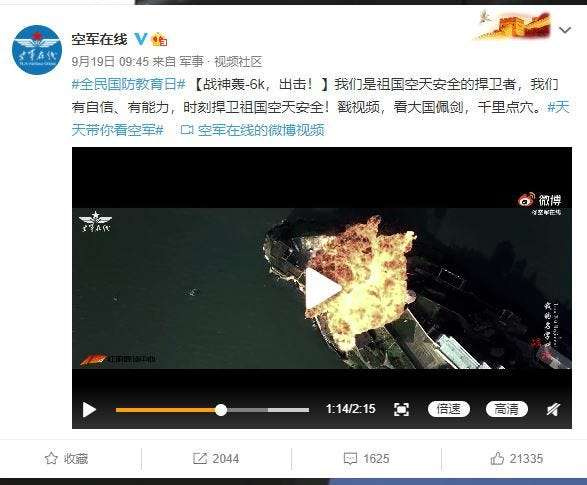
Just that the videos it used were scenes from “Transformers” and other Hollywood blockbuster movies. (Source) The attack on the airbase also has very dramatic music behind it.
The scenes of Chinese bomber aircraft in flight appear to be real PLAAF footage, but the combat scenes look like they were taken from the films "Transformers: Revenge of the Fallen," "The Hurt Locker," and "The Rock." (The links go to the relevant scenes from the movies)
The problem is most of the Chinese military officers grow up watching Hollywood movies and they start to think they are no less than those actors.
strange things also happen
Just some months ago, no one could have believed in such a partnership. But things in the world can change.

Check out this thread on Twitter for more information - Source
And this.

Indian Muslim Hebrew calligrapher in Dubai, Thoufeek Zakariyah shares the Torah with Sarah Cohen and Isaac Ashkenazi
nota bene
CRISPR COVID solution: India’s first Clustered Regularly Interspaced Short Palindromic Repeats (CRISPR) COVID-19 test has been approved for use in India. The first CRISPR has been developed by the Tata Group and CSIR-IGIB, the Ministry of Science & Technology said on Sunday. According to reports, the test uses an indigenously developed, cutting-edge CRISPR technology for the detection of the genomic sequence of the SARS-CoV-2 virus. CRISPR is a genome-editing technology to diagnosing diseases. (Source)
Nepalese want Hindu identity: Former Deputy Prime Minister of Nepal, Kamal Thapa, reiterated his demand for the government to abdicate the ‘secular’ tag and restore the country’s Hindu identity on the Himalayan country’s Constitution Day on the 19th of September, reports Hindi Daily Jagran (Source)
Attacks on Temples in AP: TDP MP Galla Jayadev urged the central government to do justice to the Hindus in AP, from continuous attacks on temples, during Zero Hour discussion in Lok Sabha on Monday. Jayadev explained to the Parliament that, "With a deep sense of anguish and pain, I am bringing to the House that two chariots of famous Hindu temples in AP were burnt recently. In the first case; they burnt nearly six decades old chariot of Lord Sri Lakshmi Narasimha Swamy at Antarvedi of East Godavari district on this month 7. The second, the chariot of Lord Prasanna Venkateswara was burnt in Nellore district on February 14". (Source)
US Debt soars: Government and business debt soared in the second quarter as the U.S. dealt with the coronavirus pandemic, even as personal net worth rose and consumer credit plunged at a record level. A Federal Reserve report released Monday showed the total household balance sheet in the U.S. rose to nearly $119 trillion in the April-through-June period, a 6.8% increase from the first quarter. (Source)
7-foot robots take over marts in Japan: Japan has the oldest population in the world, and that's causing an acute labor shortage. With almost a third of the population aged 65 and above, finding workers can be a challenge. Increasingly, companies are turning to technology as a solution — including two of the biggest convenience store franchises in Japan, FamilyMart and Lawson. This week, Lawson deployed its first robot in a convenience store, in Tokyo. FamilyMart trialed the same robots last month and says it plans to have them working in 20 of its stores by 2022. Both chains are deploying a robot named Model-T, developed by Japanese startup Telexistence. Seven feet tall when extended to its full height, the robot moves around on a wheeled platform and is kitted out with cameras, microphones and sensors. Using the three "fingers" on each of its two hands it can stock shelves with products such as bottled drinks, cans, and rice bowls. (Source)
why are Indians dominating heights in Ladakh?
There are very few credible channels, people, and analysts who share things that are serious and useful. Here is one interesting and informative video on why it is important for the Indian (or Chinese) Army to dominate the heights. Check it out.
Support Drishtikone
If you consider our work important and enriching and would like to contribute to our expenses, please click on the button below to go to the page to send in your contribution. You can select the currency (for example, INR or USD, etc) and the amount you would like to contribute.
If you like this post - please share it with someone who will appreciate the information shared in this edition -
If you like our newsletter, please share it with your friends and family -



